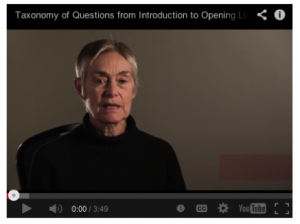Randy Bass’s “The Scholarship of Teaching: What’s the Problem?” indicates where SoTL work often begins, with the help of another significant paradigm shift:
“In scholarship and research, having a ‘problem’ is at the heart of the investigative process; it is the compound of the generative questions around which all creative and productive activity revolves. But in one’s teaching, a ‘problem’ is something you don’t want to have, and if you have one, you probably want to fix it. Asking a colleague about a problem in his or her research is an invitation; asking about a problem in one’s teaching would probably seem like an accusation. Changing the status of the problem in teaching from terminal remediation to ongoing investigation is precisely what the movement for a scholarship of teaching is all about. How might we make the problematization of teaching a matter of regular communal discourse? How might we think of teaching practice, and the evidence of student learning, as problems to be investigated, analyzed, represented, and debated?” (Bass, 1999)
Applying this disciplinary framework of “problems” as the beginning of a meaningful project to our teaching not only reinforces SoTL as a scholarly and familiar process, but also paves the way for greater problem-solving in the classroom.
By changing how we view teaching-related problems, we respond not with complaints and surrender to the status quo, but with curiosity, investigation, and inquiry—ways of thinking that start with questions.
Hutchings’s introduction to Opening Lines: Approaches to the Scholarship of  Teaching and Learning (2000) offers the most frequently cited taxonomy of SoTL work, categorized by the kinds of questions a project asks and answers (pp. 4-5). The box to the right summarizes each of the four kinds of projects she identifies. The video below offers Pat Hutchings’s reflections on her SoTL taxonomy.
Teaching and Learning (2000) offers the most frequently cited taxonomy of SoTL work, categorized by the kinds of questions a project asks and answers (pp. 4-5). The box to the right summarizes each of the four kinds of projects she identifies. The video below offers Pat Hutchings’s reflections on her SoTL taxonomy.

"Taxonomy of Questions," an online component of the International Society for the Scholarship of Teaching and Learning (ISSOTL) 2013 Conference (c/o Elon University’s Center for Engaged Learning)
For guidance on this stage of a SoTL project, see
“How to Start: Thinking of a Problem and the Questions It Raises.”

